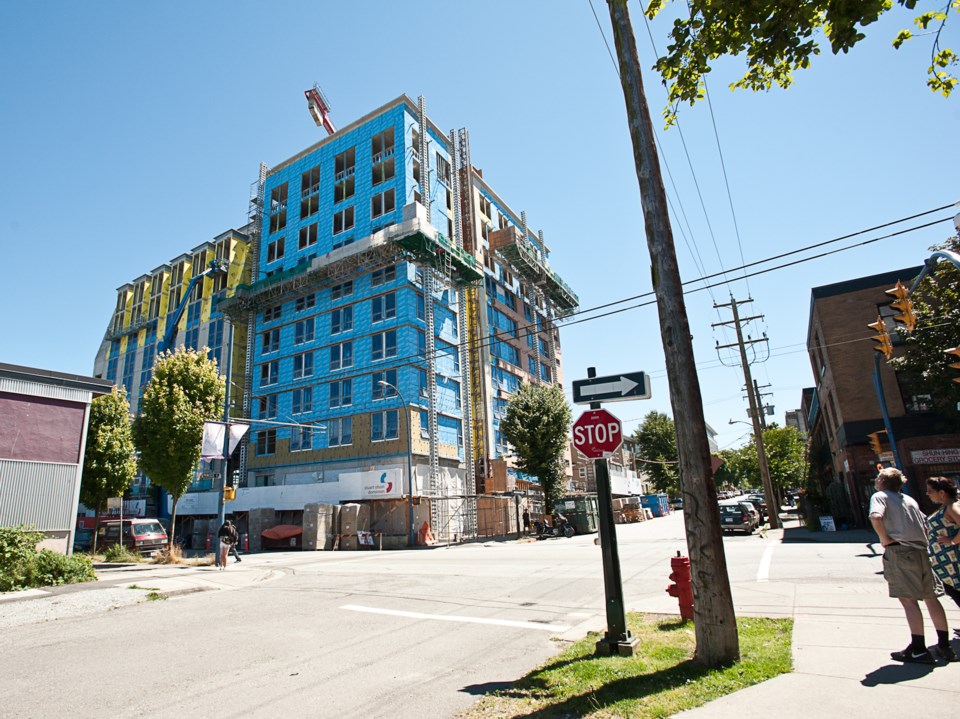The 10-storey Downtown Eastside apartment building under construction for women and children is almost a year behind schedule and only one of the parties involved would say why.
The Budzey Building, at Powell and Princess streets, is one of 14 sites for provincially subsidized social housing and will have 147 non-market units plus commercial lease space on the main floor. City hall bought the former Drake Hotel property in 2007 for $3.2 million from a numbered company connected to a member of the Hells Angels.
Coun. Geoff Meggs and Housing Minister Rich Coleman appeared at a Feb. 5, 2013 news conference to promote the project. At the time, completion was estimated for spring 2014. As of June 26, the website for construction company Stuart Olson Dominion continued to say it was “scheduled for completion in April 2014.” Last week, the Courier confirmed the new estimate for completion is February 2015.
RainCity Housing and Support Society will operate the concrete building, which is aiming to be LEED gold environmental and energy certified.
The charity’s acting executive director Greg Richmond did not respond to an interview request. Spokesman Bill Briscall said Richmond “is unavailable for an interview” and referred questions to B.C. Housing. B.C. Housing spokesman Fergus McCann said Shayne Ramsay, the Crown corporation’s chief executive, was not available for an interview.
“B.C. Housing estimated the building would be complete in spring 2014,” McCann said via email. “There were construction delays and it is now scheduled to open in early 2015.”
McCann was asked for further explanation about the delays, but he said, “You have our response.” McCann also claimed the project is “on budget,” but didn’t provide dollar figures or answer who would be liable for cost overruns, if any.
In a May 25, 2010 B.C. Housing news release, the estimated project capital cost (excluding the city’s land contribution) was $34.6 million.
By February 2013, the province said it would provide $37.1 million in construction financing and pay $891,000 for annual operations. The value of the city’s land donation was $4 million and the city agreed to waive development cost charges, reduce levies and contribute to the site cleanup, worth $902,000. BC Hydro was to provide $19,600 in equity and Streetohome Foundation $2.9 million, including $1.5 million from mining company Silver Wheaton and $500,000 from the Face the World Foundation.
Streetohome CEO Rob Turnbull said the Budzey Building had “several contractor-driven delays right from the start,” from concrete forming to elevator installation.
“It impacts us because we put out our numbers and we like to be as accurate as we can with our donors,” said Turnbull, whose charity updated its website with the February 2015 estimate after the Courier’s initial query.
A request to interview city general manager of community services Brenda Prosken was denied and city hall refused to comment on the delays.
“[B.C. Housing] is the lead on this project, so you will need to speak to them about it, we will be declining your interview request on this occasion,” said Tobin Postma of the city hall communications office.
Vancouver Mayor Gregor Robertson promised in 2008 that his Vision Vancouver party would end street homelessness by 2015. Robertson is running for re-election in November, but in April he admitted that the promise that defined his first mayoralty campaign is unlikely to be fulfilled.
Terra Housing is the project manager, but chief operating officer Simon Davie did not respond to an interview request.
Terra co-founder Jim O’Dea was a Portland Hotel Society director from 1993 until 1997 when he was named chair of B.C. Housing by the NDP government. He was replaced when the B.C. Liberals came to power in 2001 and B.C. Housing undertook a special audit of PHS.
The April 17, 2002 report by Staley, Okada, Chandler and Scott chartered accountants has never been released in full. In 2003, the Courier appealed to the Office of the Information and Privacy Commissioner, which found in favour of B.C. Housing in 2005 because it contained policy advice and third-party business secrets.
A heavily censored version of the report said auditors examined “the integrity of the financial and management controls in place at the society.”
In March, nearly 12 years after that 2002 audit, PHS’s four top managers and its entire board were forced to resign because of damning July 2013 B.C. Housing and February 2014 Vancouver Coastal Health investigations found widespread misuse of taxpayer funds by PHS.



